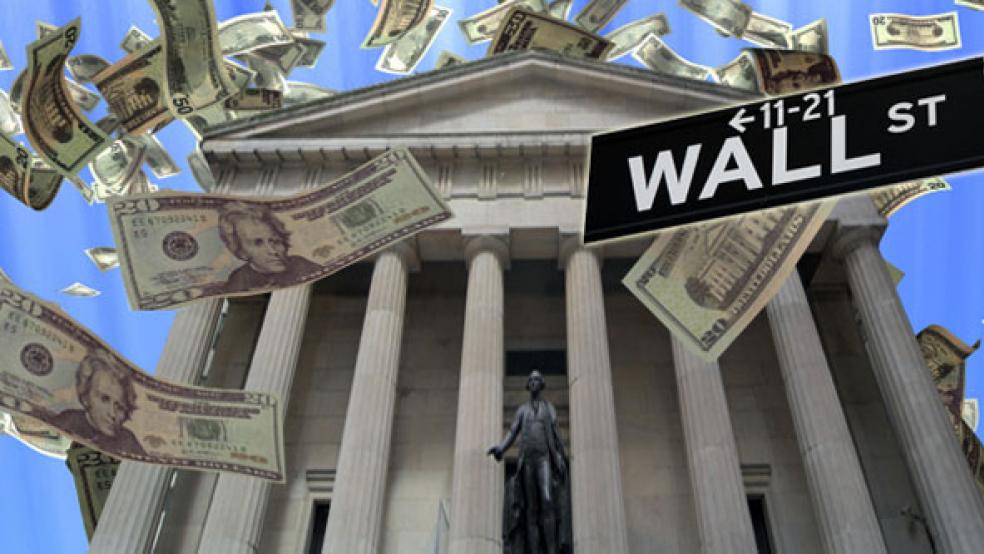In an election year that began with Wall Street getting pounded like a heavy bag in a Brooklyn gym and wrapped up with both the House and Senate mercilessly pummeling one of the too-big-to-fail banks, the financial industry has been very, very good to politicians.
Big Banks, hedge funds, private equity shops and other securities and investment firms have made more than $273 million in donations to federal candidates during the 2015-16 election cycle, according to Americans for Financial Reform.
Related: Sanders Doubles Down on Breaking Up the Big Banks
Using data from the Center for Responsive Politics, AFR – a nonprofit coalition of labor, business, consumer and civil rights groups working for an “ethical financial system” – tallied up contributions it says were designed to influence Washington. They hit levels higher than before the Great Recession.
When AFR includes money from insurance companies and real estate interests – “individuals and entities associated with the financial sector” – the number climbs to a staggering $798 million. And when lobbying in 2015 and through the second quarter of 2016 is lumped in, the total soars to $1.4 billion, or $2.3 million a day.
The biggest spenders on political gifts and lobbying include two trade groups and a big insurance/investment powerhouse, with the National Association of Realtors (NAR) in the top spot at more than $66 million, the American Bankers Assn. at more than $20 million and Prudential Financial at almost $14.6 million.
But also at the top of the list are eight firms controlled by nine older rich guys with very different politics: Renaissance Technologies, Elliot Management, Paloma Partners, Soros Fund Management, Starr Companies, and Bloomberg LP.
Related: Clinton’s Coziness With Silicon Valley: More Troubling Than Her Wall Street Ties
Elliot is a hedge fund management firm whose mastermind is New Yorker Paul Singer, a major Republican donor and perhaps the biggest money bag behind Florida Senator Marco Rubio’s run for the GOP presidential nomination. He has shelled out more than $20 million on donations and lobbying during this election cycle.
Singer is No. 3 on the AFR list, however, he may have been overtaken by another hedge fund powerhouse, Donald Sussman, founder of Paloma Partners. AFR had Sussman at No. 5, but he told The Washington Post in late October that he has given $21 million to Priorities USA, Hillary Clinton’s primary super PAC, and a total of $40 million to Democratic candidates. That would catapult him to second place, behind the NAR.
The AFR list also include tens of millions donated through entities controlled by liberal donor George Soros; 91-year-old Hank Greenberg, who backed Jeb Bush with $10 million through the firm C.V. Starr he controls; and former New York Mayor Mike Bloomberg, who endorsed Clinton in a biting attack on Donald Trump at the Democratic National Convention.
But perhaps the most interesting Wall Street firm on the list is Renaissance at more than $38 million. Money flowing from two of its principals, founder James Simons and co-CEO Robert Mercer, is going in very different directions.
Related: The Billionaire's Daughter Quietly Shaping the Trump Campaign
Simons is a mathematician who founded the highly successful quant firm, which has attracted $7 billion in investment money in the past year as other hedge funds have struggled, according to The Wall Street Journal. It now manages $36 billion.
Simons puts his considerable wealth behind climate change activists and other liberal causes. The Los Angeles Times says Simons has given $11 million to outside groups supporting Clinton super PAC.
At the same time, Mercer, who helps fund the right-wing Breitbart News, has donated more than $20 million to conservative causes this election cycle, with much of that money going to a super PAC attacking Clinton, the Times said. His daughter Rebekah has become a force in the Donald Trump campaign.
Simons toldTheTimes that he and Mercer don’t talk politics.





